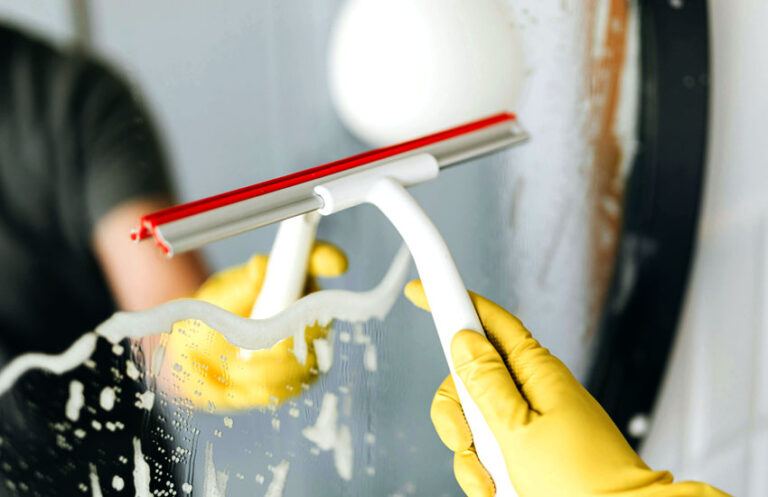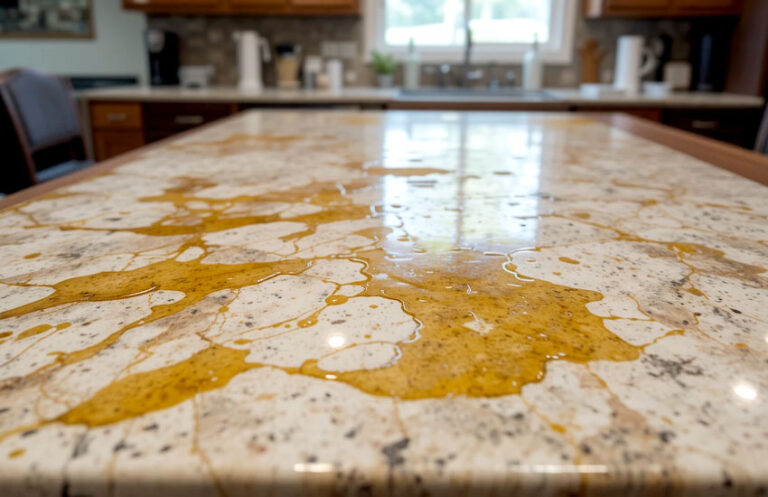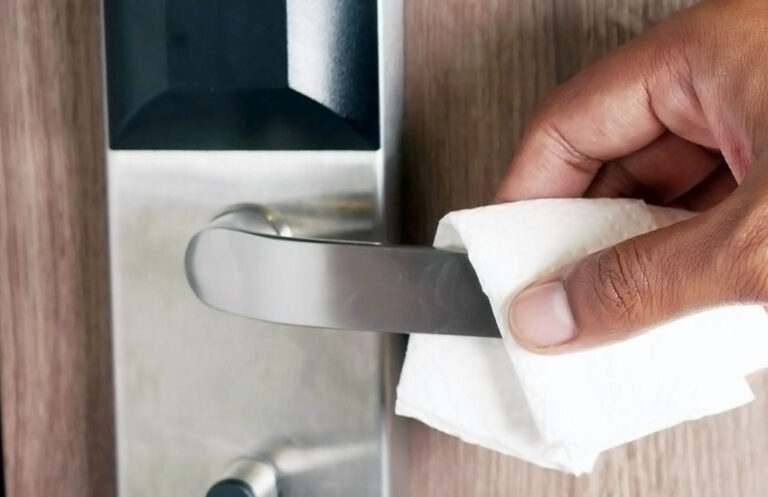As an Amazon Associate, I earn from qualifying purchases at no extra cost to you.
6 DIY Surface Cleaners You Can Make at Home
When it comes to cleaning your home, many of us rely on store-bought products that promise to leave our surfaces sparkling clean. However, these cleaning products often come with harsh chemicals that can be harmful to your health, the environment, and your wallet.
What if I told you that you could create your own effective and eco-friendly surface cleaners at home using simple, natural ingredients? These DIY surface cleaners not only work wonders but are also incredibly easy to make. Plus, they’re free from the toxic chemicals that are often found in commercial cleaners.
In this article, we’ll explore six DIY surface cleaners that you can make at home. From kitchen counters to bathroom tiles, these homemade solutions will leave your home fresh and spotless without the need for expensive or harmful store-bought products.

1. All-Purpose Vinegar Cleaner
Vinegar is one of the most versatile and inexpensive cleaning ingredients you can have in your home. It’s a natural disinfectant that can kill germs and bacteria, and it’s gentle enough to be used on almost any surface. Whether you’re cleaning countertops, windows, or bathroom sinks, an all-purpose vinegar cleaner can do it all.
Ingredients:
- 1 cup white vinegar
- 1 cup water
- 1 tablespoon baking soda
- 10-15 drops of essential oils (optional for scent)
Instructions:
- Begin by mixing the vinegar and water in a spray bottle.
- Add the baking soda and shake the bottle gently to mix it in. The baking soda helps with scrubbing and deodorizing.
- If you want a pleasant scent, add a few drops of your favorite essential oils. Lavender, lemon, and tea tree oils are great choices.
- Shake the bottle again before each use.
This all-purpose cleaner works wonders on a wide variety of surfaces, including kitchen countertops, bathroom sinks, glass, mirrors, and even stainless steel. The acidity of vinegar helps dissolve grease, grime, and soap scum, while the baking soda adds extra scrubbing power. If you’re worried about the smell of vinegar, don’t worry – the scent will dissipate as it dries.
Benefits:
- Natural disinfectant: Vinegar has natural antibacterial properties that help kill germs and bacteria.
- Non-toxic: It’s a safe, chemical-free alternative to commercial cleaners.
- Affordable: Vinegar is very inexpensive, making this an economical choice.
- Multi-purpose: You can use this cleaner on almost any surface in your home.
2. Lemon and Baking Soda Scrub
Lemon and baking soda are two powerful cleaning agents that work together to tackle tough stains and grime. This combination is perfect for deep cleaning kitchen surfaces, sinks, and even grout lines. The natural acidity of the lemon helps break down dirt, while the abrasive texture of baking soda helps scrub away stubborn stains.
Ingredients:
- 1/2 cup baking soda
- 1/4 cup lemon juice (freshly squeezed)
- 1 tablespoon water
- A small jar or bowl for mixing
Instructions:
- In a small bowl, mix the baking soda and lemon juice until it forms a paste.
- Add a tablespoon of water to adjust the consistency if needed.
- Use a sponge or cloth to apply the paste to the surface you want to clean.
- Scrub the surface in circular motions to work the paste into the grime.
- Rinse with warm water and wipe clean with a dry cloth.
This lemon and baking soda scrub is excellent for cleaning kitchen countertops, stovetops, and even bathtubs. It’s especially useful for removing stubborn grease and food residue. You can also use it to clean stainless steel appliances, removing smudges and fingerprints.
Benefits:
- Natural deodorizer: Lemon has a fresh, pleasant scent that neutralizes odors while cleaning.
- Powerful stain remover: The abrasive nature of baking soda helps scrub away tough stains.
- Safe and effective: This scrub is non-toxic and doesn’t require harsh chemicals.
- Eco-friendly: Both lemon and baking soda are biodegradable, making this cleaner environmentally friendly.
3. Castile Soap and Water Cleaner
Castile soap is a plant-based soap that’s gentle on surfaces but tough on dirt. It’s an excellent choice for creating a non-toxic, all-purpose surface cleaner that works on a variety of surfaces, including wood, glass, and tiles. When combined with water, it creates a mild solution that can clean countertops, tables, and even floors.
Ingredients:
- 1/4 cup liquid Castile soap
- 2 cups water
- 1 tablespoon white vinegar (optional)
- 10-15 drops of essential oils (optional for scent)
Instructions:
- Mix the Castile soap and water in a spray bottle.
- If you want added cleaning power, add the white vinegar and essential oils for fragrance.
- Shake the bottle gently to combine the ingredients.
- Spray the solution on your surface and wipe it down with a clean cloth.
Castile soap is an excellent choice for cleaning delicate surfaces, such as hardwood floors or granite countertops. It’s gentle enough to use on baby toys, high chairs, and other items that come into contact with food. Plus, it’s available in a variety of scents, so you can customize the fragrance to your liking.
Benefits:
- Gentle on surfaces: Castile soap is mild and non-abrasive, making it safe for a variety of materials.
- Plant-based: It’s made from natural plant oils, making it a sustainable and eco-friendly option.
- Customizable: You can easily adjust the scent by adding essential oils.
- Multi-purpose: Works on wood, glass, tiles, and even floors.
4. Tea Tree Oil Disinfectant Cleaner
Tea tree oil is well-known for its natural antiseptic and antibacterial properties. It’s an ideal choice for making a DIY disinfectant that’s safe to use around the home, especially in areas where germs are more likely to accumulate, such as the bathroom and kitchen. Tea tree oil not only helps eliminate germs but also leaves your home smelling fresh.
Ingredients:
- 2 cups water
- 1 tablespoon white vinegar
- 10-15 drops tea tree oil
- A spray bottle
Instructions:
- Mix the water, white vinegar, and tea tree oil in a spray bottle.
- Shake the bottle well to combine the ingredients.
- Spray the solution on your surfaces, focusing on areas that need extra disinfecting, like bathroom counters or kitchen sinks.
- Wipe down with a cloth or sponge.
Tea tree oil has been shown to kill bacteria, fungi, and viruses, making it a great addition to your cleaning routine. It’s especially effective in high-moisture areas like bathrooms where mold and mildew tend to grow. Plus, it’s a great way to keep your home free from harsh chemicals.
Benefits:
- Natural disinfectant: Tea tree oil has powerful antimicrobial properties that help kill germs and bacteria.
- Chemical-free: This cleaner is completely free from synthetic chemicals.
- Eco-friendly: Using tea tree oil is a sustainable option for your cleaning needs.
- Fresh scent: Tea tree oil has a clean, refreshing aroma that leaves your home smelling great.
5. Rubbing Alcohol and Water Glass Cleaner
For a streak-free shine on glass and mirrors, rubbing alcohol is your secret weapon. It’s fast-drying and effective at cutting through grime, fingerprints, and water spots. When mixed with water, rubbing alcohol makes a perfect glass cleaner that’s safe and non-toxic.
Ingredients:
- 1 cup rubbing alcohol
- 1 cup water
- 1 tablespoon white vinegar
- A spray bottle
Instructions:
- Combine the rubbing alcohol, water, and vinegar in a spray bottle.
- Shake well to mix the ingredients.
- Spray the solution onto your glass or mirrors.
- Wipe clean with a microfiber cloth for a streak-free shine.
This DIY glass cleaner works beautifully on windows, mirrors, and even glass shower doors. The alcohol evaporates quickly, which means you won’t be left with streaks or residue. Plus, the vinegar helps to cut through grease and grime.
Benefits:
- Streak-free shine: The rubbing alcohol helps eliminate streaks and leaves surfaces gleaming.
- Fast-drying: The alcohol dries quickly, making it ideal for cleaning glass.
- Non-toxic: This cleaner contains only natural ingredients and is free from harsh chemicals.
- Versatile: Works on windows, mirrors, glass tables, and more.
6. Citrus and Baking Soda Scrub
Citrus fruits like oranges, lemons, and grapefruits are not only delicious but also excellent for cleaning. Their natural acidity helps break down grime and grease, while their fresh scent leaves your home smelling inviting. When combined with baking soda, they form a powerful scrub that can tackle tough stains in the kitchen and bathroom.
Ingredients:
- 1/2 cup baking soda
- 1/4 cup citrus juice (lemon, orange, or grapefruit)
- A small jar or bowl for mixing
Instructions:
- Mix the baking soda and citrus juice together to form a paste.
- Use a sponge or cloth to apply the paste to the surface you want to clean.
- Scrub gently to remove stains, grease, or soap scum.
- Rinse with warm water and wipe clean.
This citrus and baking soda scrub is perfect for cleaning tough bathroom stains, kitchen grease, and even grout. It’s a natural, non-toxic alternative to chemical cleaners and works just as effectively.
Benefits:
- Natural acidity: The citrus juice breaks down grease and grime effectively.
- Abrasive scrub: Baking soda helps scrub away stains and build-up.
- Pleasant scent: The citrus aroma leaves your home smelling fresh and clean.
- Eco-friendly: This scrub is biodegradable and safe for the environment.
Are These Questions in Your Mind?
Is it safe to use DIY cleaners on all surfaces?
DIY cleaners are generally safe on most surfaces, but it’s important to test on a small area first, especially with more delicate surfaces like marble or wood. Some DIY cleaners may cause discoloration or damage, so always spot-test before use.
Can I use essential oils in my cleaners?
Yes, you can use essential oils to add fragrance and additional cleaning benefits to your DIY cleaners. Oils like lavender, lemon, and tea tree oil are great for this purpose, but make sure to use them in moderation.
Do I need to use vinegar in all my DIY cleaners?
No, vinegar is not always necessary. While it’s effective for many cleaning tasks, other ingredients like Castile soap, baking soda, or essential oils can be used in place of vinegar, depending on the surface or cleaning task.
Can I substitute lemon juice with other citrus fruits?
Yes, you can substitute lemon juice with other citrus fruits such as lime, orange, or grapefruit. These fruits contain similar natural acids that help break down grease and grime.
Do I have to use distilled water for my cleaners?
Distilled water is not strictly necessary, but it’s recommended, especially in areas with hard water. Hard water can leave mineral deposits on surfaces, so using distilled water helps prevent this.
Can I make my own all-purpose cleaner without essential oils?
Yes, you can make an effective all-purpose cleaner without essential oils. Basic ingredients like vinegar, water, and baking soda work well together on their own, but essential oils add a nice fragrance and extra cleaning properties.
Is Castile soap suitable for cleaning floors?
Yes, Castile soap is gentle enough to be used on floors. It’s especially good for cleaning hardwood, tile, and laminate floors without causing damage. Just dilute it with water for an effective floor cleaner.
Can I use rubbing alcohol to disinfect my home?
Yes, rubbing alcohol is an excellent disinfectant. It’s effective at killing germs, bacteria, and viruses, making it a great addition to your cleaning routine, especially for high-touch areas.
Do DIY cleaners work as well as commercial cleaners?
Yes, DIY cleaners can work just as well as commercial cleaners, if not better. With the right ingredients, homemade cleaners can tackle tough stains, remove grease, and disinfect surfaces effectively without the use of harsh chemicals.
Is it possible to make a DIY cleaner for laundry?
Yes, you can make your own laundry detergent using ingredients like baking soda, washing soda, and Castile soap. These DIY detergents are effective at cleaning clothes and can help you avoid the chemicals found in many store-bought laundry products.





